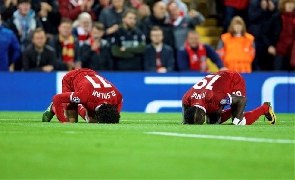 Muslim players praying on the pitch
Muslim players praying on the pitch
The holy month of Ramadan has already begun and Muslims around the world are celebrating the festival by fasting during daylight hours.
Footballers who follow Islam are also known to fast, and leagues across the planet are growing sensitive to the needs of Muslim players so that they can have their iftar even during a match. The Premier League has also come up with a set of guidelines to show solidarity with the players.
From Liverpool’s Mohamed Salah to Chelsea’s N’Golo Kante, several superstars observe Ramadan by fasting throughout the month. GOAL tells you everything about fasting breaks, match preparations and many more things that takes place during the month of Ramadan.
What is Ramadan?
Ramadan is the Arabic name for the ninth month of the Islamic calendar. It is considered the holiest month for Muslims. The beginning and the end of the month are determined by moon sightings.
During this month, Muslims fast from sunrise to sunset, abstaining from food, drink, and other physical needs. The fast is broken with a meal known as iftar, which is typically eaten after sunset.
The end of Ramadan is celebrated with a festival called Eid al-Fitr which is a month after its start.
When is Ramadan this year?
The holy month of Ramadan has already begun and the following are the start and end dates for the next five years.
Year - Start Date - Eid al-Fitr
2023 - March 23 - April 21
2024 - March 10 - April 9
2025 - February 28 - March 30
2026 - February 17 - March 19
2027 - February 7 - March 8
The days listed above are very tentative depending on when the moon would be sighted.
How do Premier League players observe Ramadan?
It is always a challenge for Muslim players to cope with the rigours of professional football during the month of Ramadan as their set matchday preparations, which include adhering to a strict diet, fall by the wayside.
However, Abdoulaye Doucoure revealed to BBC Sport that he does not miss fasting during Ramadan and yet he hasn't had any problems.
"I fast every day. I don't miss any days. Sometimes playing football has been hard because Ramadan has been in the summer and during pre-season. But I have always been lucky to practise Ramadan and there have never been problems with my physical condition - I am grateful for that," he stated.
In the UK, Suhur (food consumed before daybreak) commences as early as 2:30am GMT while Iftar (the breaking of fast at dusk) is usually observed after 8:30 pm GMT.
According to The Athletic, Wesley Fofana gets up before 2:30 in the morning to have his food during Ramadan.
This means a player has to go without food and drink for more than 12 hours which can be extremely difficult, especially on a matchday when you are expected to be at your optimum fitness.
“This poses certain challenges for footballers and professional athletes. You’ve got to be training to a high level and the main things you’re concerned about are optimising your performance, hydration, nutrition, sleep, training and recovery," told Crystal Palace’s head of sports medicine Dr Zafar Iqbal to Mirror.
In fact, he revealed that some players start fasting a few days before Ramadan as well so that their bodies can adapt quickly.
Iqbal prepares a tailor-made diet chart for each player along with the club nutritionist, and remains extremely careful to not give them carbohydrate-laden foods while they are breaking their fast.